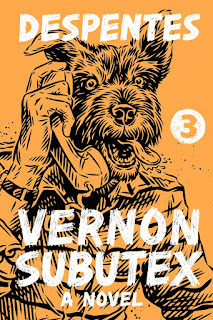I think it is possible to track the onset of middle age exactly. It is the moment when you examine your life and instead of a field of possibility opening out, an increase in scope, you have a sense of waking from sleep or being washed up onshore, newly conscious of your surroundings. So this is where I am, you say to yourself. This is what I have become. It is when you first understand that your condition — physically, intellectually, socially, financially — is not absolutely mutable, that what has already happened will, to a great extent, determine the rest of the story. What you have done cannot be undone, and much of what you have been putting off for “later” will never get done at all. In short, your time is a finite and dwindling resource. From this moment on, whatever you are doing, whatever joy or intensity or whirl of pleasure you may experience, you will never shake the almost-imperceptible sensation that you are traveling on a gentle downward slope into darkness.
Red Pill, by Hari Kunzru, was not what I expected it to be. Also, it turns out that I don't know what the red pill is anymore. I didn't know that the red pill had been coopted by the alt-right. That hardly seems fair. I've always taken the red pill.
The opening of this book, as quoted above, is a pill on its own, opening up a rabbit hole within myself.
Having recently begun talk therapy, I am finding that everything is therapy, this book included. Perhaps because, again, I am waking up to middle age. Every so often, and with increasing frequency these days, I wake up with a jolt, an urgency to seize the day, hurry before I run out of time. But for what?
Many people dislike this book because they are tired of novels about writers. I also have been tired of novels about writers. A world so privileged and niche. So unrelatable. Why would a writer write about writing anyway? Shouldn't they get outside of themselves?
I have developed a visceral dislike of being watched while I write, not just because the content might be private, but because all the things one does while writing that are not actually writing — stretching, looking out into space, browsing the internet — seem somehow shameful if they're monitored by others. The feeling of being watched induces an intolerable self-consciousness.
I have recently begun, again, to take special interest in novels about writers. Perhaps because now I am a writer myself. There, I've said it. At least, the word "writer" is in my job title. It has been for a couple of years, but I have never really owned it, until now-ish. (I am not, though, a writer of novels, let alone of novels about writers.) But it's so much this! this stretching and looking out into space that is vital to writing, but which doesn't look like work at all. I haven't, until now-ish, been able to accept this as a valid part of my work. I have always struggled to make up for it, cover it up. I feel guilty about it. There's shame in having a job that other people don't recognize as work. There's shame in having a job that allows me to stretch and look out into space, even necessitates it — I don't deserve to have it this good.
The plot of this novel — I think it is lost on me a little. What matters is what it makes me think on. This is true of almost all books for me.
The narrator is a writer who goes to Berlin for a fellowship. Of course, he wants the funding associated with the program, but he's not interested in putting in the work, both of actually writing his proposed book or of engaging in fellowship with his fellow artists. He's not abiding by the terms of the contract; he doesn't work in the very exposed common workspace, he prefers not to engage with anyone at all. One of his assigned dinner companions at the centre calls him daring, or calls him out for being daring. The object of gossip, he determines. Maybe he's just being a bit of an entitled jerk.
Another of his dinner companions argues,
The right to privacy was no more or less than the right to lie, he said. To misrepresent yourself to the world. It incubated fraud and corruption, and despite what liberals claimed it was not some sacred universal that all humans needed in order to survive.
Our fearless narrator stays in his room, mostly not writing, considering leaving the centre.
I hated being there, no one liked me, and I wasn't doing anything useful, but I wasn't ready to go back home. I wasn't qualified. I hadn't solved myself. I spent an hour or so on the internet, falling down various rabbit holes, before I finally hit on one of the things I was looking for.
I hadn't solved myself! This is what we're here for. Is that what the writing is supposed to do? Or is it the being away from the daily grind, the responsibility of family and bills and things like voting, participating in democracy, being an active member of society.
I like to think that, even before therapy, I regularly make an honest effort to solve myself. I am still a puzzle to myself, the final picture yet to be revealed. I still don't know what kind of person I want to be.
Because I still had no Wi-Fi, I couldn't do the various diverting and quasi-important things I did on the internet — read Wikipedia pages, downloading pictures of people in war zones — all the subtle and mysterious components of my not-writing. I was thrown back on my own resources, into myself, or what took place in the space where a self ought to have been.
He becomes paranoid about the workings of the centre, that he is being surveilled in his room but also outside the centre. He has been binge-watching a cop show that randomly and uncharacteristically quotes Comte de Maistre; he comes to believe the show is layered with secret meaning.
So he is having a midlife crisis or an existential crisis or a crisis of conscience (personal, political, social) or a psychotic break.
He feels "the uncomfortable sensation of contact with a stranger." He writes down
the shitty life of the woman who cleans his room at the centre, who grew up here, under the Stasi, "a whole country, reeking of piss and schnapps and cabbage soup." He meets the creator of the cop show he's watching and falls down the rabbit hole that is the cult of his personality. He follows him to Paris, and then follows the clues to go off-grid in Scotland.
His rock bottom ends his lifelong project of exploring the luxurious particularity of his selfhood and Iness, kind of. He steps outside of himself to engage with the world, only it's not clear to me, and maybe to him, whether it's the right world he's stepped into. The novel closes on election night in America, 2016, the night Hillary lost.
And somehow, even as I recognize it for the trainwreck it is, watching it at a remove, this is all relatable.
I've always found it hard to speak on cue about my emotions. I am an articulate person, but only about things that don't touch me. As soon as someone asks what I feel, I get confused. I don't have the immediate access to my feeling that seems, to my eternal amazement, to be the birthright of most human beings. What question could be more profound than how are you? It feels lazy to say just any old thing, so I look inside myself and invariably this is a terrible idea. Searching for feeling is like being the lookout on a ship, shining a lantern into thick fog. Objects that appear close at hand recede into the murk, or reveal themselves as chimera. Somewhere off the port bow are icebergs.
But how are you really? In contrast to the narrator, I am not a particularly articulate person, at least, not in person. I'm better on paper, but even then... I wonder if some days I use up all my words in my work as a writer. I wonder if this inarticulacy is why I am writer, a challenge to myself.
How am I? I am tired. But I am happy to be engaging with books again, motivated to feel things and create things.
Each time I try to find a point of departure, a place to make a stand and defend this part of my story, some narrative tentacle emerges out of the swamp, and I have to stagger back.
So this is where I am. And I am a good writer.

























